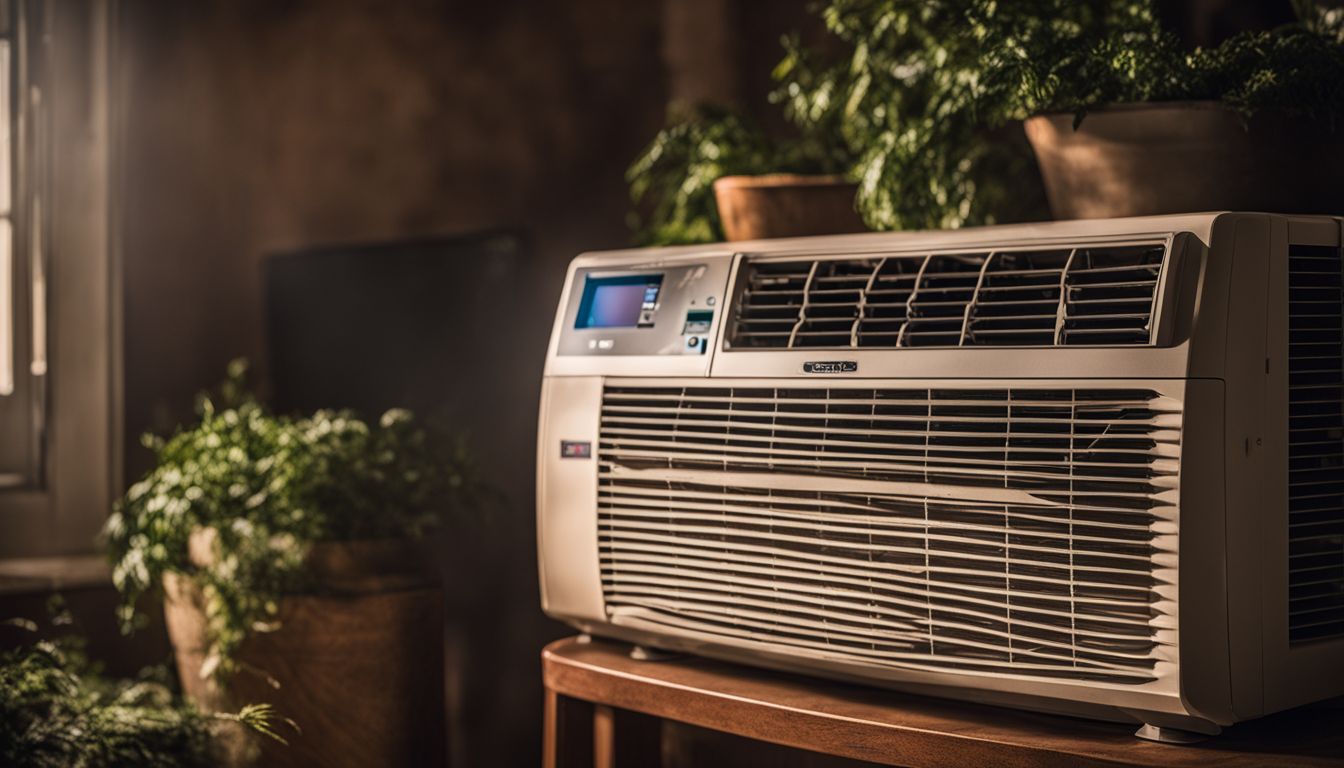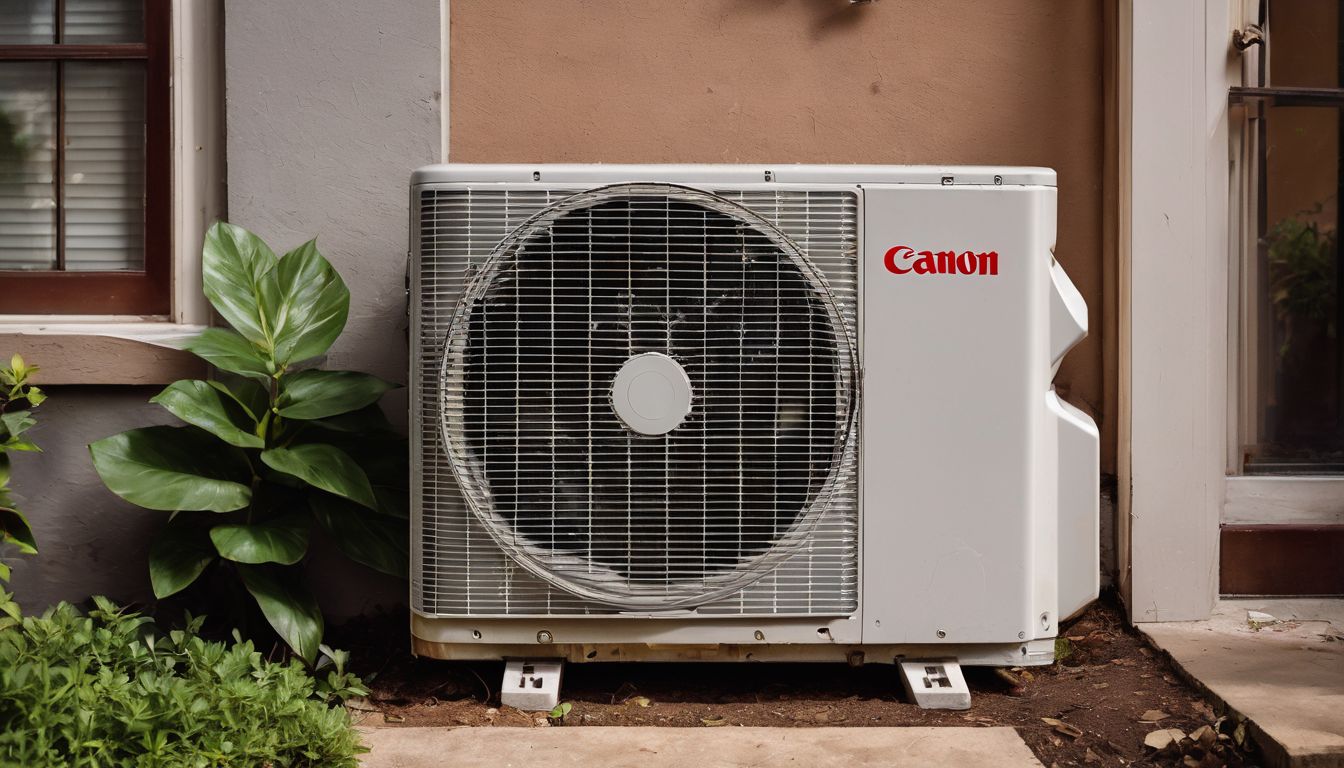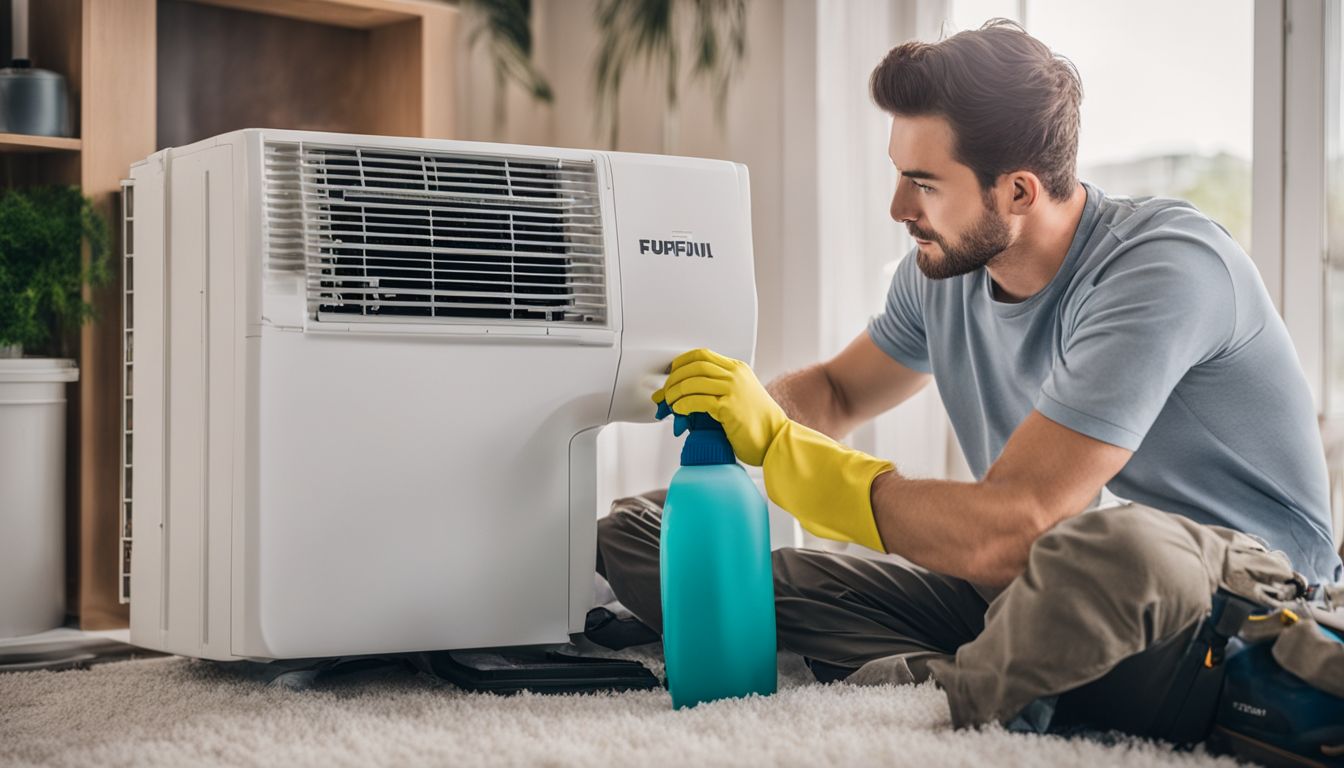As summer heats, your air conditioning works harder to keep you cool. Not enough cool air from your unit can mean it’s overworking. Our guide spotlights key signs that your AC might need a break and how you can help.
Keep reading – comfort is closer than you think.
Understanding an Overworked Air Conditioning System
An overworked air conditioning system struggles to maintain a cool and comfortable indoor environment. It may run longer than normal, working hard to reach the desired temperature without ever achieving it.
This constant strain can lead to issues such as frequent breakdowns and reduced energy efficiency. The AC’s components, from its compressor to evaporator coils, face accelerated wear and tear when pushed beyond their limits.
Air conditioners designed for less strenuous use may falter under high demand during heatwaves or in poorly insulated spaces. Inadequate maintenance contributes to the problem; clogged air filters or low refrigerant levels force the system to exert extra effort.
Each additional strain reduces cooling efficiency and could hike utility bills significantly over time. Regular servicing by professionals is crucial to ensure that all parts of your HVAC system function correctly without unnecessary stress on any single component.
Signs Your Air Conditioner is Overworked
Spotting an overworked air conditioning system is crucial to maintaining a comfortable and cost-effective environment. Keep alert for symptoms such as compromised performance and unexpected noises, which serve as telltale signs that your cooling companion may be under strain.
Decreased Cooling Efficiency
Your air conditioning system might be overworked if you notice it’s not cooling your home as effectively as before. This drop in performance can lead to high humidity levels and make indoor spaces uncomfortable.
An AC unit should consistently cool and dehumidify your living area, but a struggling system may fall short, leaving you sweating even when it’s running full blast.
Frequent on-and-off cycling or the AC taking longer to reach the set temperature are clear signs of decreased efficiency. These issues mean your system is working harder than necessary, which could eventually wear it down much faster.
Ensuring regular maintenance can help catch problems early and keep your air conditioner running smoothly without the added strain on its components.
Rising Energy Bills
High energy bills often set off alarm bells that your air conditioning system might be working too hard. If you’re noticing a sharp increase in your monthly electricity charges, it could signal that the AC unit is operating inefficiently.
Overworking can stem from several factors, including lack of maintenance or ageing components. An air conditioner straining to maintain cool temperatures uses more power and causes a surge in energy costs.
Energy waste not only hits your wallet but also puts unnecessary strain on your cooling equipment. A well-functioning air conditioning system shouldn’t have to run excessively to keep indoor air comfortable.
Spotting this trend early helps prevent further loss and preserves the lifespan of the unit. Regular checks and prompt repairs can help maintain an optimal energy efficiency ratio, keeping those utility bills in check while ensuring reliable performance from your AC system.
Frequent Repairs
If your air conditioning unit constantly breaks down, it might work too hard. Regular calls to customer service for repairs can drain your wallet and indicate underlying issues with the system.
Parts like the coil may wear out or even start leaking if they’re overused, which happens when an AC strains to regulate indoor temperatures and humidity.
Keeping track of how often you need ac servicing helps pinpoint whether you’re dealing with a tired machine. Pay attention to repeated issues such as refrigerant leaks, malfunctioning blower fans or persistent condensation problems.
These red flags suggest that your cooling equipment could be on the brink of a major failure and may not last as long as it should be without proper care and routine maintenance.
Unusual Noises
Your air conditioning system should run smoothly with minimal noise, so unusual sounds can be a clear signal that there’s trouble brewing. If you hear grinding or scraping noises from the unit, this could indicate metal components are wearing down and may soon cause significant damage without proper attention.
Persistent rattling and clicking during startup hint at potential electrical issues or loose parts anxiously needing to be addressed.
Bubbling and gurgling sounds shouldn’t be dismissed either; they often point to a refrigerant leak—an essential fluid for your AC’s cooling process. Such leaks not only compromise your system’s efficiency but also pose environmental hazards that require swift action by professionals who specialise in heating and cooling systems.
Keep an ear out for these strange noises as catching them early helps maintain indoor air quality and extends the lifespan of your air-conditioning system.
Consequences of an Overworked AC System
When an air conditioner is pushed beyond its limits, it not only struggles to keep you cool but also triggers a cascade of issues that can be costly and detrimental to both the system’s health and your comfort.
An overworked AC unit is less efficient, incurs higher operational costs, and may compromise the quality of your indoor environment.
Increased Energy Bills
An overworked air conditioning system strains to cool your home, which skyrockets your energy bills. With inefficient cooling comes prolonged running times, and this heightened energy consumption hits your wallet hard each month.
Dirty filters or leaking ducts force your AC to work overtime, directly increasing electricity costs as it struggles to maintain the desired temperature. Leaking refrigerant is another culprit; without enough coolant, the system has to run longer and push harder.
Addressing gas insufficiency is essential as it can significantly impact cooling efficiency. Inadequate levels mean more power is needed for less effective results, making a noticeable dent in household finances with escalated charges on energy bills.
Overcharging refrigerant may solve one problem but create another – excessive power use leading to a painful spike in expenses. Keeping an eye on these issues helps manage outgoings by ensuring the unit remains efficient while conserving energy and maintaining indoor air quality.
Accelerated Wear and Tear
Pushing your air conditioning system beyond its limits can cause parts to wear out faster than expected. This heightened deterioration affects components critical for keeping your home cool, like the compressor and fan motors.
As these elements struggle under increased pressure, they’re more prone to breakdowns that can disrupt the comfort of your living space.
Frequent cycling on and off puts a strain not only on mechanical parts but also on electrical connections within the system. Components such as circuit breakers may trip more often, leading to safety concerns and potential damage from power surges.
The relentless operation without adequate rest periods accelerates the ageing process of your AC unit, shortening its lifespan significantly and elevating maintenance costs over time.
Shortened Lifespan of Your AC
Constant stress on your air conditioning system can slash its lifespan significantly. Instead of the typical 10 to 15 years, an overworked AC may call for major repairs or a full replacement much sooner.
This not only disrupts comfort but also leads to unexpected expenses.
Maintaining a reliable AC means paying attention to its operational limits and needs. Ignoring these aspects allows problems to build up, accelerating wear and tear on crucial components like compressors and fans, which are essential for long-term durability.
Your diligence in caring for your unit directly influences how many years it will effectively cool your home without breaking down.
Potential Health Risks

An overworked air conditioning system can become a haven for dust and allergens. These particles circulate throughout your home, potentially triggering allergies and asthma attacks.
Regular exposure to such poor indoor air quality might cause chronic respiratory issues, as well as dry or itchy skin and headaches.
Mould and mildew thrive in environments with high moisture levels, which often happen when an AC malfunctions. This can lead to serious health problems like allergic reactions or long-term lung damage if not addressed promptly.
Additionally, the leakage of refrigerant from strained systems poses its own set of hazards including throat irritation and other symptoms related to toxicity if inhaled over extended periods.
Remember to maintain your unit regularly to keep these risks at bay and ensure a healthy living space.
Why Your Air Conditioner Keeps Shutting Down: Common Causes and Solutions
Short cycling could be to blame if your air conditioner turns off more often than it should. This frustrating issue happens when the AC cycles on and off in quick succession, unable to complete a proper cooling cycle.
Dirty or clogged air filters are frequent culprits, restricting airflow and causing the unit to overheat. Cleaning or replacing the filters can resolve this problem quickly.
Electrical malfunctions present another challenge; these might include faulty wiring or an overwhelmed circuit breaker that cuts power to avoid hazards. To address electrical concerns, enlist a qualified electrician to inspect and repair any faults in your system’s connections safely.
Meanwhile, incorrect thermostat settings or placement can trick your AC into thinking it’s reached the desired temperature too soon, leading to premature shutdowns. Re-positioning the thermostat away from heat sources and adjusting its settings can help maintain the consistent operation of your air conditioning system.
Mitigating the Dangers of an Overworked AC
To shield your home from the perils of an overburdened air conditioner, proactive measures must be taken. This involves ensuring that your cooling system is aptly matched to your space and receives regular attention to maintain peak performance and efficiency.
Proper Sizing and Installation
Choosing the right size for your air conditioning system is essential to prevent overworking and ensure efficiency. An AC unit that’s too small will run continuously, trying hard to cool your home without success.
On the flip side, a large unit may cycle on and off too quickly, not dehumidifying properly and leading to dampness issues.
Expert installation of heating and air conditioning units guarantees optimal performance from day one. Technicians evaluate factors like your home’s square footage, insulation quality, and local climate before recommending an appropriately sized AC system.
This precisely matched setup helps maintain comfortable temperatures while reducing energy consumption and improving indoor air quality without straining the equipment or causing unnecessary wear and tear on building elements.
Regular Maintenance and Servicing
Regular maintenance and servicing of air conditioning systems are crucial for their optimal performance. Scheduling routine check-ups can identify small problems before they lead to bigger issues, effectively extending the system’s lifespan.
Servicing involves cleaning filters, checking refrigerant levels and inspecting all components for signs of wear and tear.
Professionals perform a thorough examination during service visits, ensuring every part functions correctly. They look out for worn parts that might cause your unit to work harder, which could increase energy consumption.
By keeping your AC in top condition through regular servicing, you reduce the risk of unexpected breakdowns and maintain indoor air quality at an efficient level.
Conclusion
Taking care of your air conditioner is crucial for a comfortable home. Address warning signs promptly to keep cooling systems healthy and efficient. Ensure ongoing maintenance to avoid stress on your AC unit.
Keep an eye out for any unusual activity, and don’t delay seeking professional help if needed. By doing so, you can ensure your air conditioning system serves you well without unnecessary strain or cost.
FAQs
1. What are the signs that my air conditioning system is overworked?
Signs of an overworked air conditioning system include reduced cooling effectiveness, strange noises or odours coming from the AC, and unexpected increases in energy consumption.
2. Can a seasonal energy efficiency ratio (SEER) help me understand my AC’s performance?
Yes, checking the SEER rating can tell you how efficient your air conditioning system is and might indicate if it’s working too hard to cool your home.
3. Will improving my home insulation help my overworked AC unit?
Definitely! Better home insulation keeps cool air inside which reduces the workload on your air conditioner, helping to maintain good indoor air quality with less effort.
4. How can heat pumps reduce stress on traditional air conditioners?
Heat pumps, including geothermal heat systems, manage temperatures efficiently by transferring heat rather than generating it and therefore reduce energy consumption for heating and cooling purposes.
5. Is an energy audit beneficial for an overworked AC system?
An energy audit can pinpoint why your AC is overworking by assessing areas like insulation or detecting any root cause issues within your current heating and cooling setup that may affect reliability.





